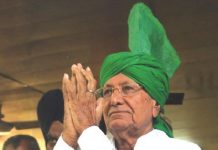Outflows from India in Swiss Banks continue to swell as the country continues to be listed among the most corrupt countries with the 86th position on the Transparency International’s Corruption Perception Index 2021
The Indians were quite elated, when in January 2021; Pakistan was ranked 140 out of 180 on the Transparency International’s Corruption Perception Index (CPI) 2021, but the government as well as its drum-beaters remain mum that India continues to be listed among the corrupt countries at the 86th position on the index.
The Indian media has been quite noisy on the issue of corruption, especially when some investigating agency raids a former minister or bureaucrat, but seldom, it tells about the follow-up and how far the allegation could be proved before judicial scrutiny. It never analyses the inadequacies of the investigating agencies in getting the conviction. It may be noted that noises in the media or the ‘media trial’ cannot be an effective tool in tackling corruption in the country.
The government’s drum-beaters focus on Pakistan that it has lost 16 spots over the previous year on the corruption index. Does it really compensate for Indians’ failure to curb the menace of the rampant corruption in the country? It may be recalled that the present ruling party, the BJP, had come to power in 2014, nine years ago, by promising corruption-free governance, and also promising that India would be the most favourable destination for investors; but India’s ranking among the corrupt countries continues to remind us that no substantial effective action appears to have been taken against the corrupt since the party has occupied power in New Delhi. In spite of the media drum-beaters, the ground realities continue to be grim in the sensitive field of governance.
There is a general perception that the BJP made deliberate effort to dilute the Right to Information Act (RTI), by amending this 2005 legislation, which was for empowering citizens to access the government files and nothings leading to the decisions. The RTI has been amended to exempt 22 organizations, including the agencies entrusted to catch tax evaders and the corrupt. Therefore, it is not surprising that it has emboldened the corrupt, who could influence the investigating agencies, thus prolonging the court trials.
On their part, insulated from any public scrutiny, these agencies have been serving their political masters by making noisy raids on some politicians. The impact of these raids appears to be settling some political vendetta, but no real punishment given to the accused.
With the amendment in the RTI, these agencies have become a law unto themselves; they could successfully avoid any close scrutiny of courts and civil society of their poor performance. Is it not true that in recent years, they could not get any big fish convicted for indulging in corruption? However, this lack of professionalism in Indian agencies under the political patronage has resulted with the flow of the Indian money in the Swiss Banks during the past seven years. In 2020, it had jumped to 20,000 crores, and in 2022 it rose further. Besides, the money held in Indian customers’ savings or deposit accounts rose to a seven-year high of about Rs 4,800 crore, reversing a two-year declining trend. The Indian Finance Ministry, however, has stated that the Indian investment could not be called the parking of ‘black money’. These funds could also be attributed to the holdings via securities and similar instruments.
It is being stated that the lack of transparency in the functioning of the investigating agencies could have reinvigorated the common man’s perception regarding the actions being taken against the corrupt. One may recall that unnecessarily the name of Arun Jaitley, the then Finance Minister, was brought under the shadow of the suspicion that the fugitive tycoon Vijay Mallya had met him before leaving for abroad. It goes to the credit of Jaitley that he had promptly denied Mallya’s statement that he had met the minister before flying out of the country in March 2016 and had offered to settle his unpaid loans. However, is it not true that during the past six years, Mallya has been enjoying his London stay? The investigating agencies never revealed that he had actually escaped.
He has been facing legal battles in London courts since then; it is yet to be ascertained when he would be finally handed over to the Indian authorities for justice.
Meanwhile, it is quite heartening that Nirav Modi, who had fled India following the unearthing of the Punjab National Bank scam, is currently behind bars at Wandsworth prison in London. With no legal options left in the UK now, he might be flown back of India anytime now.
The Corruption Hits Poor
It is quite known that the corruption is a global phenomenon found in all countries – but evidence shows it harms poor people more than others, stifles economic growth and diverts desperately needed funds from education, healthcare and other public services. An estimated one trillion US dollars get siphoned off through bribes every year by the corrupt political leaders and bureaucrats in Asia and Africa, according to the World Bank.
The issue of corruption has been raised in various UN forums. During the Conference of the States Parties to the United Nations Convention against Corruption (UNCAC), the issue is being discussed regularly. It began with its first session held in Amman, Jordan, in 2006; two years later, its second conference was held in Nusa Dua, Indonesia, the third session in Doha, Qatar in 2009 and the fifth Session was held in Panama in 2013.
These conferences have been stressing upon the importance of enlisting the support of governments, the private sector, parliamentarians, anti-corruption authorities, civil society organizations, young people and the media cooperation in rejecting corruption at every level of society. The recovery of stolen public assets has also been widely discussed and the conference agreed to work to remove barriers to asset recovery. This is a particularly important issue for many developing countries where high-level corruption has plundered the national wealth and where resources are badly needed for reconstruction and the rehabilitation of societies.
The UN Convention against Corruption
The UN Convention against Corruption (UNCAC) came into force in December 2005 and has been ratified by 155 States, more than two third of the Member States of the United Nations. It is the only international legal instrument to fight corruption. The Convention obliges States to prevent and criminalize corruption; to promote international cooperation; to recover stolen assets and to improve technical assistance and information exchange in both the private and public sectors.
The Convention introduces ground-breaking measures in four areas: prevention, criminalization, international cooperation and asset recovery.
During the past two decades or so, these international conferences have evolved effective mechanisms dedicated to preventing corruption with measures directed at both the public and private sectors. These include model preventive policies, such as the establishment of anticorruption bodies and enhanced transparency in the financing of election campaigns and political parties. States must ensure that their public services are subject to safeguards that promote efficiency, transparency and recruitment based on merit.
Transparency and accountability in matters of public finance must also be promoted and specific requirements are set up for preventing corruption in critical areas of the public sector such as the judiciary and public procurement.
Need for Restoring RTI
The inability of the Union Government under the BJP’s decade-long tenure to curb the menace of corruption reminds us that the most effective way to tackle corruption is by promoting open and fair governance. The RTI Act 2005 had considerably diluted the Officials Secrets Act 1923. Earlier, the corrupt could hide behind the veil of secrecy under the 1923 legislation, which had been happily retained during the post 1947 era. It had taken almost half-a-century for the civil society in India to get the RTI Act, but the BJP leadership chose to dilute it and make it as ineffective as possible; thus undermining its own agenda against corruption.
(A New Delhi-based independent columnist offers an in-depth study. The views expressed are his own.)













